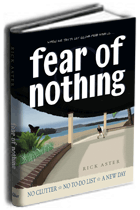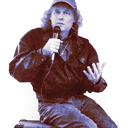Bruce Muzik, speaking at TEDxSinCity on May 14, talked about “The Big Secret Nobody Wants to Tell.” I don’t think I’m giving too much away by explaining that “the big secret” does not mean what it sometimes means, when you’re afraid everyone but you knows what’s going on. This time, it’s the reverse. The big secret is any recurring conflict that permeates your life that you never get any help with because you never mention it, afraid of what might happen if people find out.
This state of living is more debilitating than people realize. It can ruin your mood and fill up your time in ways that defy rational explanation. It can seem that there is no way out. Stevie Nicks writes of a character with a big secret: “She rarely goes out/She spends every day/Waiting for the day/When everybody finds out.” People in this state lie awake at night wondering what to do. The suspense of waiting for people to uncover your big secret is as painful as any other long-term suspense. The solution, Bruce says, is to own up to it.
Bruce’s talk is a fast-paced 20 minutes, worth viewing if you can take the time.
Many people are surprised to realize that everyone’s big secret is something different. It can also be surprising how non-secret some people’s “big secrets” are. If someone who shakes the floor with every step tells you, “I’m afraid people think I look fat,” try not to respond with, “Well, duh.” The other side of this, of course, is that your own big secret may not be a big deal to very many people.
Some people imagine that owning up to a secret will require a long story, but it doesn’t. It takes only one sentence to say that things are not what they seem. This is an example, from my own life:
I’m afraid my voice isn’t pretty enough for me to succeed as a singer.
The simple declarative statement can take various forms and still be enough to give away the secret. Everything beyond that, then, is just details. If the truth seems too hard to explain, then explain the deception: “I try to create the impression that _________, but actually _________.”
Authenticity, after all, is not about going around setting the record straight. As Bruce points out, that can never really be done in an absolute sense. As part of the same point, he suggests that nearly everyone is trying to obscure their true nature.
But I’d like you to consider this. A professor of psychology at University of Massachusetts named Robert Feldman is an expert in deception, and his research shows that when two people meet each other for the first time they lie on average three times every ten minutes. So if at times we’re lying 18 times an hour, I invite you to consider that perhaps we’re all liars to some degree, and we all have secrets, and the best we can do is not to try to stop lying. The best we can do, if we are all liars, is to tell the truth about where we lie, and openly, honestly, take responsibility for what we’ve done.
It’s also about taking responsibility for what we’re trying to do. If the main thing you’re expressing in life is a matter of obscuring who you really are, it takes away some of the ability to express what you’re trying to do in life. That makes life unnecessarily complicated, and the complexity we experience is the ultimate cost of having a big secret. Give up the secret and you can begin to express simply and directly what you are trying to do — and then, it turns out that what you are trying to do is not really so complicated.



No comments:
Post a Comment